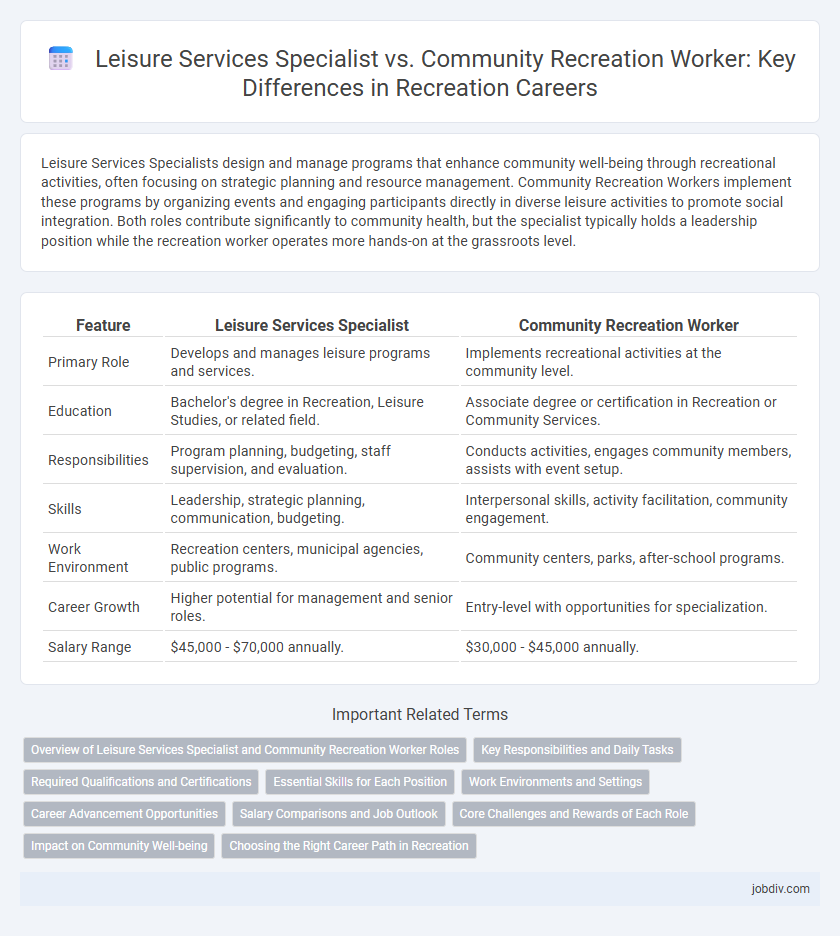Leisure Services Specialists design and manage programs that enhance community well-being through recreational activities, often focusing on strategic planning and resource management. Community Recreation Workers implement these programs by organizing events and engaging participants directly in diverse leisure activities to promote social integration. Both roles contribute significantly to community health, but the specialist typically holds a leadership position while the recreation worker operates more hands-on at the grassroots level.
Table of Comparison
| Feature | Leisure Services Specialist | Community Recreation Worker |
|---|---|---|
| Primary Role | Develops and manages leisure programs and services. | Implements recreational activities at the community level. |
| Education | Bachelor's degree in Recreation, Leisure Studies, or related field. | Associate degree or certification in Recreation or Community Services. |
| Responsibilities | Program planning, budgeting, staff supervision, and evaluation. | Conducts activities, engages community members, assists with event setup. |
| Skills | Leadership, strategic planning, communication, budgeting. | Interpersonal skills, activity facilitation, community engagement. |
| Work Environment | Recreation centers, municipal agencies, public programs. | Community centers, parks, after-school programs. |
| Career Growth | Higher potential for management and senior roles. | Entry-level with opportunities for specialization. |
| Salary Range | $45,000 - $70,000 annually. | $30,000 - $45,000 annually. |
Overview of Leisure Services Specialist and Community Recreation Worker Roles
Leisure Services Specialists design, implement, and evaluate recreation programs to improve community well-being, often focusing on specialized populations such as seniors or individuals with disabilities. Community Recreation Workers facilitate group activities, lead events, and support day-to-day operations in recreational facilities to promote social engagement and physical health within diverse community settings. Both roles prioritize enhancing quality of life through organized leisure activities but differ in scope and specialization.
Key Responsibilities and Daily Tasks
Leisure Services Specialists design and coordinate recreational programs, manage facilities, and evaluate community needs to improve service delivery. Community Recreation Workers focus on implementing and leading recreational activities, supervising participants, and ensuring safety during events. Both roles require strong communication and organizational skills to promote inclusive and engaging leisure experiences.
Required Qualifications and Certifications
Leisure Services Specialists typically require a bachelor's degree in recreation, leisure studies, or a related field, along with certifications such as Certified Park and Recreation Professional (CPRP) or First Aid/CPR. Community Recreation Workers often need a high school diploma or associate degree, with preferred certifications including CPR, First Aid, and specialized training in youth or community programming. Both roles benefit from strong communication skills and experience in program planning, but Leisure Services Specialists generally hold more advanced qualifications for supervisory and administrative responsibilities.
Essential Skills for Each Position
Leisure Services Specialists excel in program planning, resource management, and leadership skills necessary for designing and implementing recreational activities tailored to diverse populations. Community Recreation Workers emphasize strong interpersonal communication, conflict resolution, and community engagement abilities to foster inclusive environments and ensure participant safety. Both roles require organizational skills and cultural competence, but the specialist often handles strategic development while the worker focuses on direct community interaction.
Work Environments and Settings
Leisure Services Specialists typically work in public parks, community centers, and municipal recreation departments, managing and developing programs for diverse populations. Community Recreation Workers often operate in local non-profits, schools, and youth organizations, providing direct services and hands-on support to participants. Both roles require adaptability to indoor and outdoor environments, with a focus on enhancing community engagement through recreational activities.
Career Advancement Opportunities
Leisure Services Specialists often experience faster career advancement due to their specialized skills in program planning and management within parks, recreation, and leisure industries. Community Recreation Workers typically start in entry-level roles with a focus on direct community engagement and may progress to supervisory or coordinator positions through gaining experience and certifications. Both career paths offer growth opportunities, but Leisure Services Specialists tend to qualify earlier for leadership roles in municipal, nonprofit, or private sector recreation programs.
Salary Comparisons and Job Outlook
Leisure Services Specialists earn an average annual salary of $48,000, while Community Recreation Workers typically make around $35,000, reflecting differences in responsibilities and required qualifications. The job outlook for Leisure Services Specialists is projected to grow by 8% over the next decade, driven by increasing demand for organized recreational programs. In contrast, Community Recreation Workers have a slightly lower growth rate of 5%, influenced by budget constraints in local governments and nonprofit organizations.
Core Challenges and Rewards of Each Role
Leisure Services Specialists face the core challenge of designing programs that cater to diverse populations while managing limited resources, rewarding them with the impact of enhancing community well-being through organized activities. Community Recreation Workers often confront challenges related to direct engagement with participants, including addressing varying individual needs and promoting inclusivity, which offers the reward of fostering social connections and improving quality of life at the grassroots level. Both roles demand strong interpersonal skills and adaptability, with Leisure Services Specialists focusing more on program development and Community Recreation Workers on hands-on facilitation.
Impact on Community Well-being
Leisure Services Specialists develop and manage programs that promote physical activity, social interaction, and mental health, directly enhancing community well-being through structured recreational opportunities. Community Recreation Workers engage with diverse populations to facilitate inclusive recreational activities, fostering social cohesion and reducing isolation within neighborhoods. Both roles contribute significantly to community health by encouraging active lifestyles and supporting social connections.
Choosing the Right Career Path in Recreation
Leisure Services Specialists design and implement programs focused on enhancing community well-being through recreational activities, requiring strong program management and organizational skills. Community Recreation Workers engage directly with diverse populations by leading and facilitating recreational activities, emphasizing interpersonal communication and hands-on involvement. Selecting the right career path depends on whether you prefer strategic planning and program development or active community engagement and interaction.
Leisure Services Specialist vs Community Recreation Worker Infographic

 jobdiv.com
jobdiv.com